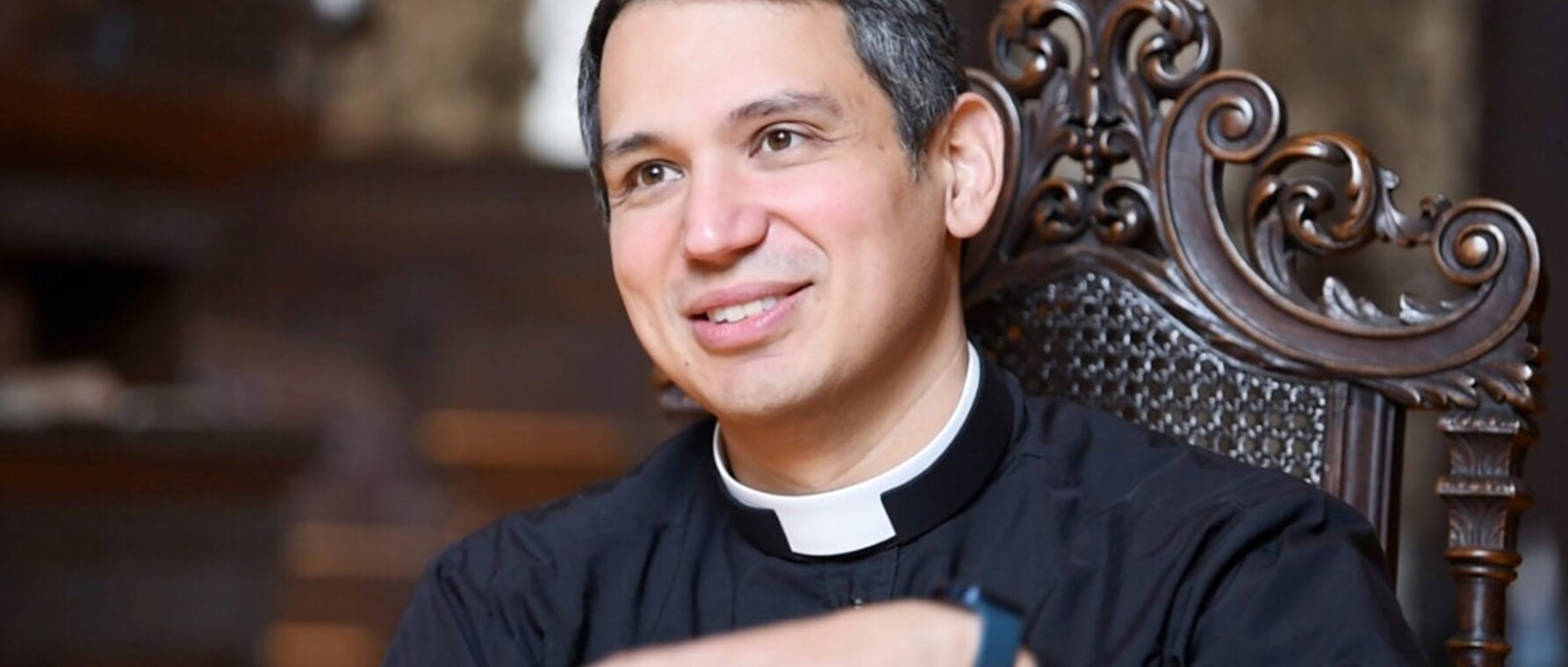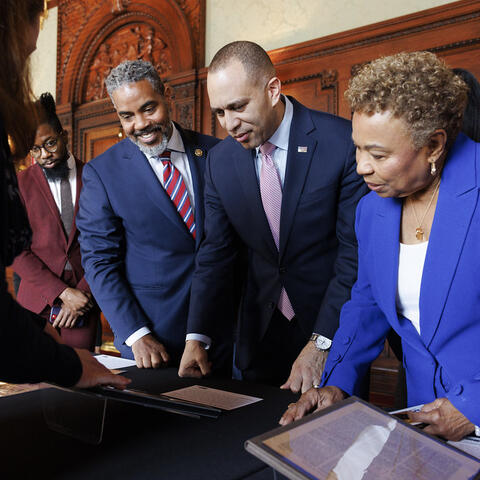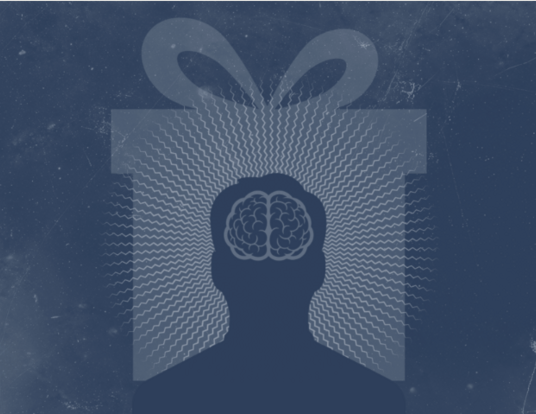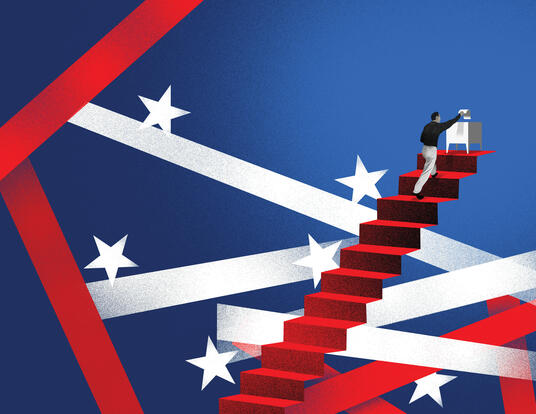Colloquy Podcast: Inclusion, Justice, and Love in an Apocalyptic Moment
Championing a Christian ethics that is at odds with white supremacy and cultural hegemony

As the Christmas holiday approaches, Rev. Dr. Matthew Ichihashi Potts, PhD ’13, says that the United States is in the midst of an “apocalyptic moment.” The inequities of the COVID-19 pandemic, the fight for racial justice, and the crisis of climate change are revealing the aspects of our society—and ourselves—from which we can no longer turn away. Now Pusey Minister in Harvard’s Memorial Church and Plummer Professor of Christian Morals, Potts preaches a Christian ethics that is at odds with white supremacy and cultural hegemony—and he’s got some hard questions: Can we turn away from prejudice and fear and toward inclusion? Can we stand for justice without falling prey to self-righteousness? Can we face up to how hard it is to love and do it anyway?
Note: This transcript has been edited for clarity.
In 2016, you wrote that the United States was experiencing its own “apocalyptic moment,” a time when “the shakiness of our foundations has been troublingly revealed.” It's five years later. Where are we now?
Part of I think what I was playing with in that phrasing was that the word apocalypse in Greek just means revelation. The end of the world was supposed to reveal things about the way things are really fundamentally that are masked from us. If apocalypse is a revelation, I think that revelation continues. And something like the pandemic, although familiar to dystopian fictions and films, the idea of a global pandemic, the way we culturally or colloquially speak about apocalypse is sort of in dystopian terms.
The pandemic fits that model. But the pandemic has also, again, revealed to us truths about ourselves that maybe we did not want to face or weren't good at facing, again, just basic inequalities, the discrepancies between who has access to vaccines and who doesn't, who suffers worse health outcomes when they get COVID than others. The pandemic continues to reveal to us who we are and the contours of the world we live in.
And so, when I say it's apocalyptic, I don't mean necessarily, or I don't mean only that it is sort of threatening civilization in a unique way, although that's what apocalyptic tends to mean when we talk about it culturally or colloquially. I also just mean it just tells us something about ourselves that we ought to listen to and ought to pay attention to. So yeah, I think we're in the same moment. I think the moment is as dire, more dire than it was.
You're an Episcopal priest. I know that speaking to the experience of those who are seen as outsiders, as marginalized, as the other is a priority for you in your ministry. How do you understand your responsibility to those people? How do you understand our responsibility?
Well, I think in two ways, right? I mean, I'm a professor at the Divinity School and I'm a minister at the church here at Harvard. I think as a scholar and as a writer, one of the things I take seriously is trying to rethink-- maybe rethink is the wrong word-- to think through the Christian tradition and rethink where necessary those parts of the tradition that I think do not adequately or robustly enough live into this commitment to including and welcoming the stranger, right?
I mean, ironically for me that's a Christian principle. I mean, I'm a professor of religion and literature and of theology and Christian morals or whatever. But I'm also a Christian. That's why, as you said, I'm an Episcopalian. And that's why I'm the minister here; because I am a Christian.
And for me, that basic principle of welcoming the stranger, and welcoming the stranger as a stranger, not asking them to convert and no longer be a stranger, right, but welcoming the stranger, welcoming the other as other and honoring them in their difference and not ask them to erase their difference in order to be in community with you. To me, that's a really important as a Christian principle. It's a theological principle. And it's, ironically, a theological principle that a great deal of Christian, historical Christian theology does not live up to.
And so, one of the things I want to do is as a Christian theologian is to think through the tradition and try to hold it accountable to that standard in a better way, to its own standard, what I would say is its own standard, in a better way. And one of the ways I do that is by looking to texts other than traditional Christian theological texts. I like to look at contemporary fiction, especially contemporary fiction by folks who are not necessarily Christian or not overtly Christian, not because I'm trying to baptize their writing as Christian, but because I think in so many places, the Christian tradition has failed to say what it ought to say. And the better versions of its own teaching arise and folks who do not have that identity—and I'm not trying to give them that identity, again, it's just because I believe I can learn from them. So as a scholar, that's the one thing.
As the minister of the church here at Harvard, I think it's a similar thing, but more practically applied, that this is a historically Christian university. It's not anymore, of course. But it was founded by the Puritans. It was founded as a place to train ministers. There's a giant Protestant church in the middle of campus, which has a lot of space and a lot of staff.
And that's not true of other religious people or organizations or religions on our campus, right? And so, it's a mark of an inequity right in the middle of the campus. And it's not one that I think can be easily or should easily be erased. I think when you erase the Christian history of this place or if you pretend it doesn't have it, then you could run into the problem of not recognizing where and how that Christian history continues to impinge upon folks and how we become less welcoming. So, I don't think it should just be erased or undone entirely.
On the other hand, I think it's important, especially for a person like myself who has been installed into that position at the center of the University in this big church with this big staff to recognize that it is a sign of inequity, and that part of my responsibility is to try to share, to reach out to others, to use the resources that the church has to meet the needs of folks who may never darken the door of our church, right, and who may never come into our student oasis and study like a lot of students do, but to recognize that we have a responsibility, not just Christian students, but to supporting all of our students at Harvard.
We have a responsibility, not just to Christian students, but to supporting all of our students at Harvard.
There's so much going on across the campus and in higher education in general, and in a larger sense in our society, about wanting to create spaces where everyone feels as though they belong, regardless of their identity and background. But it seems to me that we still don't really know how to do that. And I wish you could speak from your experience as a minister in a multi-religious community at a multi-religious divinity school, multiethnic, multiracial, your own experience of your own multiracial family, about how we bridge that divide, how we create that conversation.
Inclusion is essential and important. I think one thing that we forget or that we don't take seriously enough is that the notion of inclusion presumes difference. You don't have to include something which is already part of you. You don't have to include that which is the same. Inclusion means there is going to be some difference that remains.
I'm not going to make you like me. That's not inclusion. That's conversion, right, or whatever. Inclusion actually presumes that we are not going to agree on some things. We are not going to share some identities. In many cases, these conversations tend to circulate around how do you-- how do you get people to know you're telling the truth? And I'm not sure you can do that, because there's too much kind of—too much good research that shows that the truth isn't persuasive.
I'm more interested in how you get people to believe that you care about them and get people to trust that you care about them. Trust to me is the more important thing than truth. And if we are bad at talking to each other and listening to each other, it's not because we're bad at persuading each other the truth, because humans are just bad at that. We're bad at hearing the truth and we're bad at telling the truth to others.
I think it's a sign that we have not demonstrated to one another that we are worthy of trust. We have not demonstrated to one another that we care. With family or at a university setting or with students who might not be Christians, for me, I think, my first task is to try to love them, to try to show them that I care about them and that I'm worthy of their trust, and so that even if we disagree or even if we have even potentially bitter disagreements, that they can presume good intention from me.
You've talked before in an article I read on the Harvard Divinity School website, you talked about the book that you're working on about forgiveness and how it was inspired by something you called “reckless, unconditional love.” And when I read that line, I wondered what you meant by it, because I think love is a word that gets tossed around a lot. And I'm not sure we really know what it means or how it really looks.
So for me, when I talk about reckless, unconditional love, I think what I mean by that is two things. It's unconditional in the sense that the teaching to forgive in a lot of the Christian tradition is tied really closely to the teaching to love your enemy. And this, for me this becomes the important question, what does it mean to love your enemy?
I don't think that means, I don't think Jesus means in the New Testament, I don't think the tradition means that loving your enemy means you have to trust them without warrant or feel warm feelings towards them. It means you have to intend their good. But what intending they're good and what intending their good means and what actions you actually take in the world, that's where the thorny ethical problem comes in.
So you can see a figure like Dietrich Bonhoeffer, who was a Christian pacifist. Bonhoeffer was a 20th-century German theologian who was a spy in Germany during World War II, helped many Jewish people escape Germany, but he was also a very famous pacifist. And he had made writings about pacifism before the war, and then during the war ended up participating in an assassination plot against Hitler and was eventually executed for that, and also for smuggling Jewish people out of Germany. Just before Germany was liberated, he was executed.
And after that, when people found out that he participated in this assassination plot, there was a lot of, oh, we thought he was a pacifist. We thought that he declined the use of violence. And he did right to the end.
But what he said was that-- what he said was that I was left with two impossible choices. I was left with either not doing anything, or not doing anything, would be which would be a grave sin, or acting, which would also be a grave sin. You have to act. And the way that he would love his enemy would be to regret what he had to do to his enemy rather than to hate them, to repent for having had to do it, and to mourn their deaths, right?
I think one thing that we forget or that we don't take seriously enough is that the notion of inclusion presumes difference.
I think loving, loving doesn't translate into the same action in every situation. And actually, in many situations where there is no pure action, in every situation where there is no pure moral action, what you're left with is a lot of bad choices. And you have to choose which choice is the most loving to all involved, even if that action is one that you have to repent because you can't actually be perfectly loving to everybody at the same time, right? So, when I talk about reckless unconditional love, I think it's unconditional because you're always intending the good, even of your enemy. It's reckless because sometimes it's not in the best interest of you and might be in the best interest of others.
What I'm very conscious of in our culture and in our society, and I'm sure you are, too, is the enormous prevalence of self-righteous anger. How do we avoid the pitfalls of self-righteousness? And what do you draw on from your tradition to do that?
From my own tradition, I think what we would say, and I take this from somebody like Bonhoeffer as well, I think, is that self-righteousness is an illusion always. I mean, in the world as it is, there's no way to be purely in the right. You're always at least a little bit in the wrong.
And there have been less, let's say less helpful versions of this kind of doctrine in Christian theology, like what's called original sin or John Calvin's total depravity. I think those convey the wrong sense to folks, right, like there's like this corrupt moral, utterly depraved corrupt center to every human. That's not how I want to think about it and how I like to think about it. I think about it the way somebody like Bonhoeffer would, which is that this world is really complicated. And we have a lot of moral obligations and a lot of directions. And there's actually no way for us to-- and we are also required to act. We cannot do nothing. Doing nothing is also a failure.
So there's no way to act in which your action will be pure and purely serves every moral interest that you ought to hold, which means you're always going to fail a little bit. And not acting is not an option, because that's also failing. So believing in your own purity and the purity of your own intentions and the purity of your own actions, you've already failed, because then you do not allow yourself to be called to better by those around you, because when you become committed to your own purity, then you become at least the kind of-- I mean, this is making a big leap, but I'll make one, I guess, it leads to the kind of identity policing and nationalisms that we see, especially in movements like white nationalism, right, like this rejection of any impurity, like we're going to be a pure people, whatever.
This kind of really disgusting rhetoric is, as I see it, conceptually linked to an anxiety around purity in general, whereas I-- and that's where it leads. I mean, that's closely linked with self-righteousness. I think it'd be very different-- I'm a pacifist, kind of like Bonhoeffer. That doesn't mean that I believe I would never in any instance take violent action. It means that if I ever did, I would feel it a thing that I would need to repent and make amends for, even if it was a necessary thing, right?
So the necessary thing isn't necessarily a moral good in that kind of strict sense. It might just be the necessary thing that still demands some need to acknowledge was a tragic necessity, not a righteous one, right? And so this is, for my own tradition, that's how I think about avoiding self-righteousness.
I want to talk to you about where we find the capacity to create King's beloved community, for instance. You've talked about how for you what's at the core of it is love, despite the fact that we get that term wrong a lot of the time the way that we do forgiveness. How do we cultivate that in ourselves so that we can act out of it?
You posed the question as “How do we do this for ourselves?” I think the answer is we have to do it for others. I think to a degree we can't. We have to love ourselves, of course. But we have to spend our energy trying to build up love in others, and in so doing trust that love will be built up in us by others, and so to establish communities which are beloved communities, like Dr. King's, ones in which we do feel that kind of support.
The good news of the Gospels is that love triumphs. Again, I think of the same way I want to moderate or complicate how I define love and how I define forgiveness, I also want to complicate and moderate what I mean by triumph, right, in the Christian tradition, because Jesus definitely dies and he definitely suffers. And even those of us who believe in his resurrection, it was—the accounts of it that we have are hazy and difficult and challenging and even fearful in some of the Gospels, right? And so even triumph is a word I use advisedly and with some qualification.
I do believe love is the answer. I don't think feeling loved is so easy. And I don't think feeling lovable is so easy. I think it was easy for me. And I feel really grateful and lucky for that. So but I also don't want to pretend that that's a simple solution or it's as easy as saying, just love yourself, or just be beloved or just believe in love, because the evidence just from social media usage among teens, and I have an 11-year-old daughter, right, is that the way we are structuring our world right now makes loving yourself really hard and feeling loved really hard.
When I talk about reckless unconditional love, I think it's unconditional because you're always intending the good, even of your enemy.
And so I think that's why I'm hemming and hawing. I do think love wins. I don't think love is easy. And I think we need to cultivate better habits of making others feel loved. And I think that means for people who do have privilege and power, as we started this podcast with me talking about how people in power don't do enough to respond to the moral demands of the world, people in power, for those who do have power and privilege, I think one of our most important moral tasks is to recognize who is unwanted who is unloved, why and how that occurs, and do our damnedest to try to fix it, because the repercussions are global, right, and terrible.
How are you thinking about Christmas this year? What does it mean to you in the midst of this apocalyptic moment?
One of the challenges of Christianity is that we are both supposed to insist upon the not yet, even as we were supposed to embrace what is right now, right? So, we believe God loves us as we are. We believe God wishes that we would become something transformative, something better, right, not because God will love us better when we do, but just because we are called to become something else, right?
Again, Bonhoeffer said, the Church is not the nice people, the good and moral people you will one day meet who gather in a building with you. They're the ornery, difficult people that you already meet with. That's the Church. The Church is what it is right now, even if it is called to something else, right?
And so when we come to this part of the year-- we're recording this in the season of Advent, just before Christmas, the Christian season of Advent, which is this time of anticipating and waiting, it's this weird season in the Christian Church calendar because it's a time of anticipating the birth of Jesus on Christmas Day. But we do it every year. And, of course, Jesus was born 2,000 years ago. It already happened, right? We're waiting for the thing that has not yet happened. And I think that encapsulates one of the spiritual paradoxes of Christianity, which is that we are both meant to embrace the now as a way to face what has not yet become.
And so this is what I mean about this Christmas. We are at this unique point in history. I mean, every moment in history is called unprecedented. But if that's true, then this one's unprecedented as well. There's this global pandemic. There have been global pandemics before, but there's this one. There is the unique situation of climate change and the civilizational threat it poses. There's a reckoning with racial violence and injustice in this country, which is ongoing but is at a particular stage. We are at a particular stage of that reckoning now in this country.
And I think that what I worry about is that we would say, oh, we are awaiting the coming of Jesus. At the end of all these things, once they have been resolved, that is what it means for us to come at to arrive at the beloved community. What it means for us to wait for Jesus is to believe that Jesus is coming, will solve all these things, when, in fact, I think the Christian message is something more like, nope, this is the world into which Jesus comes, not the better world that we imagined for ourselves, but this world as it is.
And we are the people to whom God comes, not the better people that we imagine in the future who will be more worthy of that gift, or even the better versions of ourselves that we hope to become. Nope, just us as we are we are the people to whom God comes. And so maybe the message of Christmas from within the Christian tradition is even more dramatic—when we're in the middle of a pandemic, when we're facing this unique civilizational threat—because this is the world we have. These are the problems that we have.
We are the people to whom God comes. And so that gift is given not as an easy magical fix to all those problems. The gift that's given is the hope, the courage, and the love to actually do the really demanding and taxing and difficult work of addressing the scale and scope of those problems.
The Colloquy podcast is a conversation with scholars and thinkers from Harvard's PhD community on some of the most pressing challenges of our time—from global health to climate change, growth and development, the future of AI, and many others.
About the Show
Produced by GSAS Communications in collaboration with Harvard's Media Production Center, the Colloquy podcast continues and adds to the conversations found in Colloquy magazine. New episodes drop each month during the fall and spring terms.
Talk to Us
Have a comment or suggestion for a future episode of Colloquy? Drop us a line at gsaspod@fas.harvard.edu. And if you enjoy the program, please be sure to rate it on your preferred podcast platform so that others may find it as well.
Get the Latest Updates
Join Our Newsletter
Subscribe to Colloquy Podcast
Simplecast





